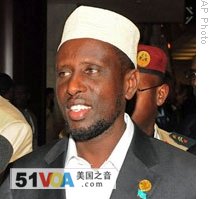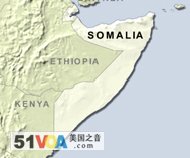Nairobi
03 February 2009
 |
| Somalia's newly elected president Sheikh Sharif Sheikh Ahmed arrives at the UN compound in Addis Ababa for consultations, 01 Feb 2009 |
After fighting a two-year-long anti-Ethiopian insurgency alongside other Islamist groups, the faction representing the Islamic Courts Union says it supports Islamist leader Sheik Sharif Sheik Ahmed's new role as president of a Western-backed unity government being formed in neighboring Djibouti.
Speaking to the media, Islamic Courts Union spokesman Abdurahin Isse Adow, praised Sheik Sharif for helping end Ethiopia's military occupation in Somalia. Adow says he is the right person to form a responsible government based on Islam.
He says the courts welcome Sheik Sharif's election as president because he can be trusted to form a good government that will implement and uphold the Islamic Sharia law.
The Islamic Courts Union endorsement of Sheik Sharif is not unexpected. Its fighters are considered mostly nationalist and they have been supportive of Sheik Sharif, who was the ICU chief in 2006 during the Islamists' brief rule over much of southern and central Somalia.
 |
Last June, Sheik Sharif enraged hard-line Islamist leaders by negotiating a peace deal with the Ethiopian-backed government during U.N.-sponsored talks in Djibouti. The move divided the Islamist opposition, and many Somalis feared that Sheik Sharif would be on the losing side for reaching out to the West.
That is because few believed that Ethiopia, as part of the peace deal, would withdraw its troops from Somali soil and allow an Islamist-led unity government to be formed. The biggest threat to Sheik Sharif, the al-Qaida-linked al-Shabab group, continued their fight against Ethiopia and the government, regaining control of most of southern and central Somalia.
But the departure of Ethiopian troops last month prompted clan elders and influential clerics to call for an end to the insurgency, which has killed more than 16,000 people and has left more than one million people displaced in Somalia. The leaders urged Somalis to support Sheik Sharif, who is now being seriously viewed as a peace-maker.
In addition to the Islamic Courts Union, Sheik Sharif also received an endorsement from Ahl-Sunna Wal-Jamea, a long-established Islamic organization which has recently taken up arms to fight al-Shabab extremists.
Al-Shabab and other hard-line Islamist leaders in Somalia have issued scathing criticism of the Djibouti accord and Sheik Sharif, denouncing him as "a sell-out" who has joined the enemy.
On Monday, one of the spiritual leaders of al-Shabab, Hussein Ali, reiterated the group's opposition to participating in Somalia's unity government.
Ali says all Somalis are being warned not to support the efforts in Djibouti to form a government by "God's enemies."
He did not say what would happen if Somalis defied the warning.